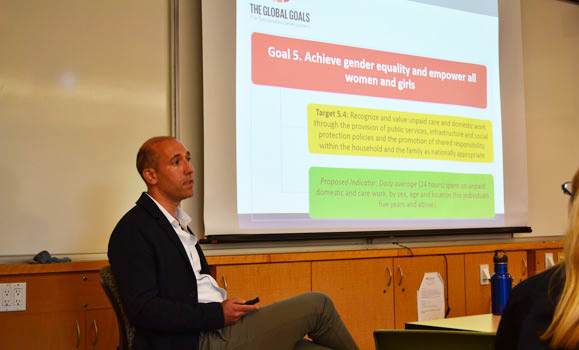With nearly 200 sessions held over the course of four days, there was a lot to learn at this yearŌĆÖs Dal-hosted .
But it was a performance on the final day by this yearŌĆÖs 3M Student Fellows that served as a potent reminder that thereŌĆÖs plenty more to learn once the conference ends and everyone heads home.
ŌĆ£Do you foster belonging for all students?ŌĆØ
ŌĆ£How do you incorporate Indigenous people and world views into the structure of your university?ŌĆØ
ŌĆ£Does your institution pose barriers to some people's belonging?ŌĆØ
Those were the takeaway questions posed to attendees by Dal Engineering student Bai Bintou Kaira, Trent University student Erin Hayward and University of British Columbia student Laura Yvonne Bulkand during their segment on the theme of inclusion, support and accessibility.
Read more: 3M Student Fellows: Student leadership on the national stage (April 2017)
Their performance ŌĆö part verbal documentary, part physical theatre ŌĆö was just one portion of a provocative hour-long plenary presentation by this yearŌĆÖs 10 student fellows (including DalŌĆÖs Anika Riopel) that centred on the themes of unity, collaboration and empowerment.
The performance fit well within the theme of the larger conference, Gateways in Higher Education: Cultures, Transitions, Transformations. With nearly 900 participants and volunteers from around the world at this yearŌĆÖs conference, there was a wide diversity of perspectives and topics to dig into.
Presentations from the dozens of Dal participants alone covered a vast range of new research in the field on everything from enhancing first-year and undergraduate experience to academic innovation and integrating diversity.
Indigenizing the academy
Judy MacDonald, director of the DalŌĆÖs School of Social Work, and Wendy Terris Klaus, distance-education coordinator with the school, offered a session Thursday on their experiences integrating Indigenous knowledge into their department.
ŌĆ£Diversity is not a checkbox. ItŌĆÖs not something that you can say, ŌĆśThere, I did it,ŌĆÖŌĆØ explained Dr. MacDonald. ŌĆ£ItŌĆÖs something you have to live with, something you have to continuously engage with and continuously challenge yourselves with and be able to participate in those tough decisions and tough discussions.ŌĆØ
Klaus, who works with faculty to develop online courses and support the students taking them, explained how the School went from looking at indigenizing a single course on child welfare to exploring a more holistic approach for the whole department.
That meant integrating it in a way that impacted not only curriculum but also the student-service side of the departmentŌĆÖs operations, particularly the admissions process, said Dr. MacDonald.
The department consulted with Indigenous scholars such as the SchoolŌĆÖs own Nancy MacDonald and the Schulich School of LawŌĆÖs Naomi Metallic over several months starting last fall to uncover the changes needed as part of the ongoing initiative. For example, the School plans to update its affirmative-action policy to recognize alternatives to volunteer experience on entrance applications in recognition that students from reserves donŌĆÖt typically have access to as many of those opportunities.
The quest for quality and innovation
Academic quality and innovation were also major themes during the conference.
Dal President Richard Florizone emphasized the importance of both in his remarks during the Presidents Panel on Thursday, which also included outgoing Mount Saint Vincent President Ramona Lumpkin, NSCAD University President Diane Taylor-Gearing and Association of Atlantic University Executive Director Peter Halpin.
ŌĆ£We owe it to our students. ItŌĆÖs our obligation to them,ŌĆØ said Dr. Florizone. ŌĆ£We should be able to enable them to compete with the best in the world, right? And prepare them to go anywhere.ŌĆØ
╠²
Dr. Florizone also touched on the importance of work-integrated learning, being inclusive in recruitment, the continued need for of one-on-one, face-to-face learning in a technological era, and the importance of undergraduate success.
ŌĆ£The most important part of the student experience is completing the degree,ŌĆØ he said. ŌĆ£Without the credential in hand, the vast majority of students and their families lose and waste a tragic amount of investment in time, money and hopes and dreams.ŌĆØ
Improving the first-year experience
Several sessions honed in on the first-year student experience, both from a retention perspective and on how to enhance learning.
Matthew Schnurr, an International Development Studies (IDS) professor at Dal and recipient of STLHEŌĆÖs 2016 Brightspace Innovation Award, presented his research on whether role-play simulations can enhance learning for first-year students.

While thereŌĆÖs been plenty of research done on how simulations improve learning outcomes for students in upper-year courses, Dr. SchnurrŌĆÖs research shows that it can do the same for entry-level students despite the fact that they tend to have less of a base of knowledge to build on.
Dr. SchnurrŌĆÖs research, done in collaboration with two of his now-former graduate students, also showed that students were adaptable when it comes to the different platforms used to enhance the simulation, including websites, learning software and social media.
ŌĆ£WeŌĆÖre dealing with a generation of student who are technologically savvy and sophisticated,ŌĆØ explained Dr. Schnurr. ŌĆ£It doesnŌĆÖt matter whether theyŌĆÖve seen the technology before. It seems to be just giving them a suite of technologies to choose from and allowing them to make judgements about which ones best serve their needs.ŌĆØ
A call to action
With such a wealth of first-hand research and focussed topics, it was the student-led finale that truly provided the push for attendees to take what theyŌĆÖve learned into action.
As Theatre and Environment, Sustainability and Society student Anika Riopel, one of the Dal 3M student fellows, said in her impassioned spoken word piece on apathy:
ŌĆ£How do we break through? Unite. LetŌĆÖs work together: let go of the limitations and restrictions of the status quo, because if we stop, maybe weŌĆÖll be able to see our power, our possibilities.ŌĆØ

